From the Nazi Conquest of Paris to the Liberation of a Concentration Camp to a War with Cancer and, finally, Building a Community in Texas:
Denise Salamone has seen it all.
FORT WORTH, TX. The cicadas haven’t begun their pulsing late afternoon thrum in Fort Worth, which means Spring has not yet given itself over to the powerful north Texas summer heat that blankets the city long after the sun sets.
During this pleasant time of year, the Clear Fork of the Trinity River draws out people from all around the city, whether to fish along its banks, jog or bike on the paved trails that line it or just walk the family dog and let the stress of the day dissolve in the soft river breeze.
It doesn’t take great weather, though, to coax Denise Salamone out to the river. Hot or cold, or rain or shine, Denise and her golden retriever, Moses, will be there, every evening.
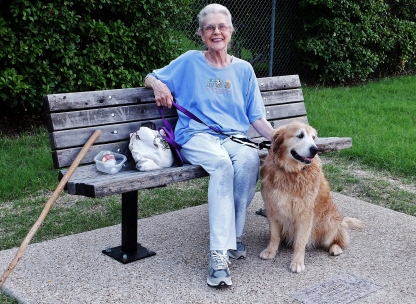
Denise and Moses are hard to miss. Physical ailments force the wispy 91-year-old to move slowly and with a walking stick for balance. Due to a back injury suffered years ago that has worsened over time, Denise walks nearly bent to the ground. The first time most people see Denise, they quietly wince in fear that her willful dog might pull her down, or in concern that the short trek from her home to the river community she cares for is just too many steps for her seemingly frail body to take.
But then Denise’s sparkling eyes catch theirs, and her smile and infectious spirit draw them in from being spectators to nearly instantaneous friends. Denise and Moses know just about everyone on the trails, and especially their dogs. It’s no wonder she’s earned the nickname, “Mayor of the River.” She is an effortless community uniter.
Paris, 1940
Moses, who Denise obtained from a rescue service, is not her first dog. As she explains, “He’s my fifth dog, and my last one!” Denise and her first dog, a spaniel named Keke, were eyewitnesses to history.
Denise Effernelli was born in 1927 in Strasbourg, France, to an Italian father and a French mother. Denise’s father was always entrepreneurial, and the family moved to Paris when Denise was young. That is where she and Keke lived in May 1940, when Adolf Hitler ordered German forces to invade France.
Swift German victories against Allied troops left Paris in near total fear, and Parisians began a rapid evacuation of the city. The Effernellis were no different, so they instructed their two girls that the family would be leaving the city to escape the coming battle. Denise, however, insisted that she would only leave Paris if the family brought Keke along. So, they did.
It’s difficult to imagine the cacophonous perpetual-motion machine that is Paris as solemn and still as Denise describes it when the family left. “The only things in the streets were cats and dogs,” she remembers. She was 13 years-old.
Denise and her family fled south, unsure of where to go or what would befall them and their city. As it turned out, however, instead of a drawn out and deadly street-to-street battle, it took the Germans only four days to move on Paris, and the Nazis marched through the Arc de Triomphe with no resistance.
The Effernellis had managed to board a truck on which they traveled south for two weeks. When they learned Paris was “safe,” and with no clear idea of where else to go, the family decided to return to their City of Lights, now gone dark.
The return trip was very different for Denise and her older sister, Pierette. Vehicle wreckage and even dead bodies were strewn on different parts of the road. The family slept on the side of the road, mostly, although Denise remembers one night when they slept on the floor of a church that had been emptied of all furniture.
For the first time in Denise’s young life, she knew real hunger. In two weeks, she had gone from a middle class family in the most acclaimed city on earth to a hungry refugee searching for a safe place to sleep.
Denise remembers that things would have been much worse but for a kind French officer they met who allowed the family to take some sugar, coffee, eggs and other food stuffs to help the family survive the journey back to Paris. The officer also warned them away from a bridge which the French army was set to blow up.
Eventually, the family arrived back in Paris. Denise remembers crossing a temporary bridge the Nazi soldiers had built across the River Seine. “There was a German guard there on the bridge. He was smiling and drinking French champagne. He had an entire box there with him.”
Life in occupied Paris turned out to be intolerable for the Effernelli family. Denise remembers the German soldiers passing by the family apartment every morning to go to the nearby bathhouse, from which German songs would ring out down the street. If the humiliation of the occupation was not enough, the Germans imposed severe rationing on the Parisians who remained, and Denise’s father decided after one year that they must try their luck elsewhere.
The Connector
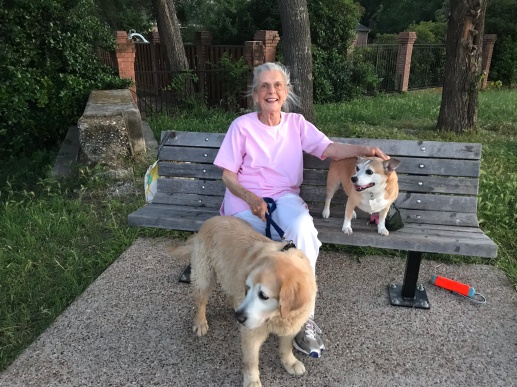
Back on the Trinity River, a mallard hen calls loudly as her paired drake chases her in a weaving route around Denise’s “mayoral office” – a group of park benches shaded by gently swaying oak trees. Denise, who has come out to meet me and bring photos from her life, has begun to attract an array of friends.
A young woman named Mandy moved to Texas about four months ago from Australia. Mandy likes to jog with her dog along the river, so she met Denise almost immediately. “She’s so friendly,” Mandy muses. “She’s a connector. She makes me feel welcome.” Mandy kneels down and scratches her dog’s ears and then looks with kind eyes at Denise, “I feel like you have adopted me. Thank you.”
“It’s amazing isn’t it,” I ask Mandy, “how everyone knows her?” Denise pulls out the little bag of carrots that she always carries with her to the river and offers one to Mandy’s dog. “It’s the dogs, ” Denise smiles, “They all know I have treats.”
Italy, 1941
The Effernelis had an option that most French citizens did not. Denise’s father still had Italian citizenship, so the family decided to see if life might be better in Italy – an ally of Germany and, therefore, an enemy of France. Denise recalls that the French were not happy with the family’s decision to go there.
Fascist Italy, however, was even less pleasant than occupied France. Her father could not find work, but local authorities put fourteen-year-old Denise to work in a pipe factory. Due to the war, food was scarce. Denise recalls that on more than one occasion, she passed out from hunger.
Denise’s father later heard there might be work in Strasbourg, France, where (through Denise’s mother) they still had family. He traveled there alone and found work as a truck driver. In 1942, Denise and her mother and sister followed.
Texas Hospitality
Back in Fort Worth, Denise’s grandson comes running up the hillside to tell her about a “huge” fish he just caught. He’s gone before Denise can even respond, sheepishly calling as he jogs off, “I’ll be back soon!”
Although Denise is now 91 and suffering from various physical ailments, she has not lost her keen mind or her independence. “I still drive, you know,” she says, in her mild but unmistakable French accent, “I go to PetsMart for Moses, and I go to the grocery store, but I don’t like the freeways. Too much traffic!”
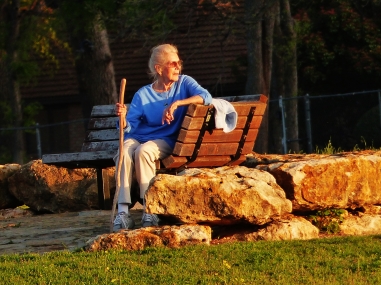
Denise’s daughter comes to check on her daily, but the highlight of her day – every day – is her walk down the bike path to relax with her extended family of dogs and Texans. Denise credits others with how beloved she has become along the river. “People in Texas are really friendly. They show it more, you know.” Denise doesn’t miss a day, and she usually stays two to three hours every time she comes out.
War, 1942-1944
The City of Strasbourg in the Alsace-Lorraine area, is where Denise’s mother Marguerite Jeunesse was raised. Alsace has switched back and forth between Germany and France and because of this, over time, developed a unique culture. Its capital, Strasbourg, is situated close to the modern French border with Germany. A cultural crossroads of sorts, Strasbourg is an appropriate place for the headquarters of the European Union.
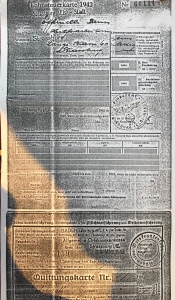
In 1942, the Effernelli family rented an apartment in Strasbourg. War demanded that all members of the family do their part, if the family did not want to starve. Denise’s father adapted quickly to Strasbourg’s war-born black market and soon became skilled in the trade of cigarettes and other valuable items. Denise worked too, and although the work was less physically demanding than the pipe factory in Italy, it was also less rewarding. The Germans required every business in the city to hang a photo of Adolf Hitler on its walls. Denise worked every day framing photos of the most hated man in France.
The Nazis had forcibly removed Jewish citizens from Strasbourg, and Denise remembers people refusing to rent the empty apartments to anyone, in hopes their Jewish neighbors would one day return.
Today, Denise speaks French, English and Italian. Although she learned to speak German during her time in Strasbourg, she afterwards immediately forgot the language. It was not by accident. “I erased it from my mind.”
In Strasbourg, war was not rumors of danger or the sound of bombs and gunfire in the distance. Fourteen-year-old Denise endured its direct fury. Fighting in the region was fierce. (The US 3rd Army alone sustained 55,182 combat casualties during its “Lorraine Campaign.”)
Denise remembers that American bombing runs would come in the daytime. “They only bombed Strasbourg in the day. At night-time, they bombed in Germany.” One day, bombs completely destroyed the family’s home, and Denise began to suffer from nightmares.
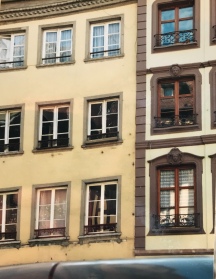
Bombs and guns were not the only danger. Nazi soldiers visited brutality on Denise’s father, beating him facially, when he failed to volunteer a “Heil Hitler” salute as they passed him on the street.
Strasbourg provided the family a means of income, but the cost on the girls was too high. After discovering an available room there, the Effernellis decided to move Denise and Pierette away from the city to to the tiny Alsatian village of Epfig.
Separated from their parents, the sisters earned their keep in Epfig by picking grapes in the vineyards. Even Epfig, though, was not “safe.” “We always wore the same green sweaters,” Denise said, “so that we would blend in with the vines.”
Denise remembers when the Third Army, commanded by General George S. Patton, liberated Epfig. The Germans knew the Americans were coming. She and Pierette hid near a window one evening and listened as the German officers and soldiers argued about whether to abandon their post. The Germans fled Epfig that night, and soon thereafter, Patton’s battle-hardened troops arrived.
The farmers the girls were staying with would not let them go out in the street as the Americans marched through, but they did let the girls make sandwiches and drinks to set out for the men on two low window sills in the home. Many grateful GIs hungrily accepted the food, but one American soldier simply jumped through the open window and into the house. Denise and Pierette were shocked for a moment, but the lanky American went straight for a piano he had glimpsed through the window and, to the delight of his fellow GIs (and the girls), pounded out “Boogie Woogie Bugle Boy” on the keys. Denise laughs and exclaims, “It was the happiest day of my life!”
Meanwhile, on November 23, 1944, French General Philippe Leclerc de Hauteclocque and his troops liberated Strasbourg. It was a moment of French pride by design. The Allied commanders hoped Leclerc would be the first to cross the Rhine, and the men under Leclerc’s command more than earned their welcome into Strasbourg. Marguerite looked up the next day and noticed the French flag flying proudly over the famous Gothic-style Strasbourg Cathedral, and she took a photo. The war was closer to an end.
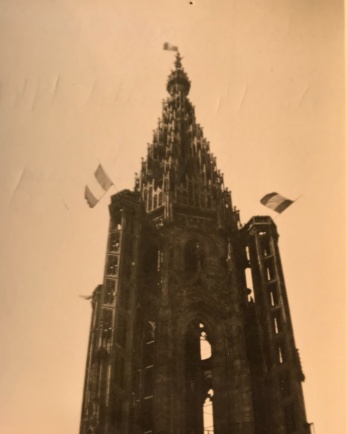
Denise’s parents immediately set out for Epfig to reunite with their daughters and return them to Strasbourg. They only had bicycles for transportation, so the trip took two weeks.
The rumor in Alsace was that General Patton was annoyed that the Allies had allowed Leclerc (instead of himself) to liberate Strasbourg and, as a result, had pulled his troops back away from the city, leaving it vulnerable. Alsatians feared a possible German reconquest.
The reunited Effernellis learned of a place for rent in the town of Schirmeck, west of Strasbourg. So, that is where they moved next. Schirmeck did not suffer from the hovering unease that had settled over Strasbourg, but it bore a perhaps more lasting scar.
Near Schirmeck was a German-run concentration camp called Natzweiler-Struthof. Lesser known than the infamous camps such as Auschwitz, Natzweiler-Struthof was the only concentration camp on French soil, and it was a house of horrors. From May 1941 to March 1945, between 19,000 and 20,000 people died in the Natzweiler-Struthof camp system.
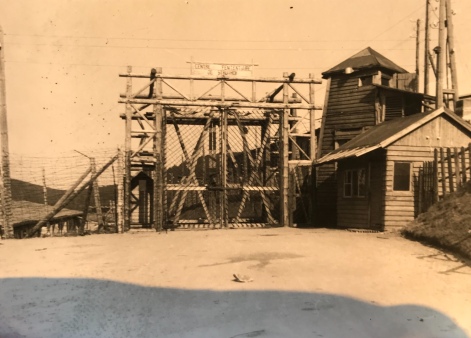
Rumors began to emerge about atrocities that had occurred at the camp, and Denise and her sister were some of the first civilians to witness, first hand, the evil soon revealed to the world.
Denise and Pierette rode their bicycles to the camp and were allowed to walk through. They saw the gas chamber where prisoners were executed and the “oven room” where the Nazis destroyed their bodies with ruthless efficiency. Some time later, Denise returned and photographed the oven with a table that still held a few shoes from the Nazi’s prisoners. “When I first went there, the table was stacked high with shoes.” She also remembers the hair. “There were bags and bags of women’s hair” – shaved by the Germans before they murdered their victims.
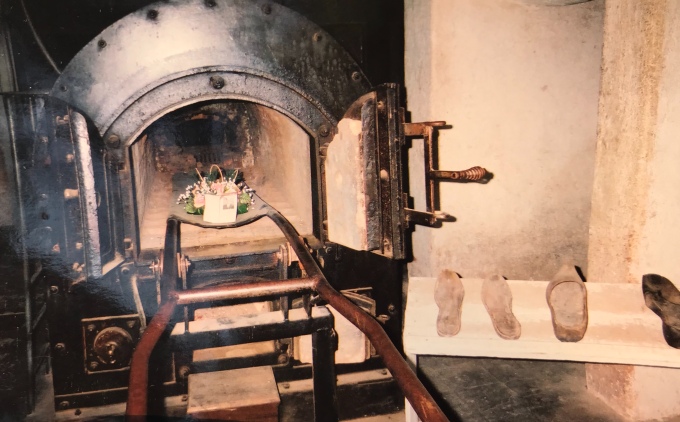
Denise also recalls a room which she did not fully understand at the time, but which we now know was used for pseudo-scientific medical experiments. “There was a large table in the middle of the room, sitting on a single pedestal. On the sides of the room were drains, where they could wash away…,” Denise’s voice trails off.
America
One great hope, evinced through world history, is that even in the midst of war and the cruelty of humanity, love flourishes. It was such love, in a way, that eventually brought Denise to America.
Pierette fell in love with an American GI she met in Strasbourg. When the war finally ended, he returned to the US, but he wrote and asked Pierette for her hand in marriage. Pierette replied that if he was so interested to marry her, he should come to France to get her. He did.
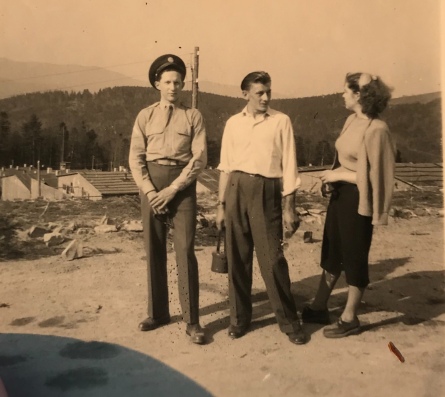
The new bride persuaded her little sister to follow her to America. Denise did, and the girls’ parents eventually followed as well. “If Pierette didn’t meet her soldier, we would have all stayed in Alsace!”
Twenty-five year-old Denise Effernelli arrived in Chicago, IL, in the winter of 1952. She could only shiver so long in the Chicago cold. She left Illinois and, after a stop in Florida, found herself in Erie, Pennsylvania.
It was in Erie that Denise met her husband and became Denise Salamone – and where she truly settled in. Denise lived in the same home in Erie for forty-six (46) years. She and her husband raised a daughter there. Denise was far from the bombs of Strasbourg and the horrors of Schirmeck, but her battles were not over.
Cancer and Loss
At age 60, doctors diagnosed Denise with breast cancer. “My daughter was very upset, but I told her, ‘I’m not afraid of cancer! I survived the war!’”
As it turns out, cancer was no more of a match for Denise than the Nazis. She persevered until the cancer cells, like the unwanted German soldiers, departed.
Denise’s husband passed away when she was seventy. Independent as ever, Denise carried on. She found comfort in the community and the ritual of her Catholic church in Erie, where she remained active. She also began regular visits to Texas, where her daughter was married to a physician and raising Denise’s two beautiful grandchildren.
Becoming Mayor
Denise Salamone discovered the Trinity River trails during her early visits to Texas to see her family. Denise met a couple who lived nearby, Ann and Paul. Ann was from England, and Paul was from Austria, and they were both dog lovers. Of course, they hit it off with Denise right away.

Ann and her little dachshund Otto are now regulars when Denise and Moses set up every evening by the Trinity. “This place is wonderful for conversation,” Ann says in her lovely British accent. “People put their phones away and just talk.”
Ann and Paul actually helped Denise find a home in Fort Worth when her daughter (and the river?) finally convinced her to leave Erie. Denise moved to Texas permanently in 2013 and purchased a home near the “Trinity Trails.”
The sun is getting lower in the sky when Ann (and Otto) and another friend Melissa (and her dog Henry) arrive. Moses is sharp, and he learns quickly which of Denise’s friends like to pay attention to him. Moses immediately wants to play with Melissa.
Before Melissa takes Moses to chase throw toys, she says to me quietly, “You know, Denise is always in pain, but she never complains about a thing.”
My dog Charlie returns from the river with a tennis ball stolen from Moses and proceeds to shake water on both of us. Denise just laughs. “It’s fine! It’s not a problem.” As we continue to wind down the evening, she mentions off-hand that her cancer came back about four years ago. When I ask for more information, she replies, “I have to take the pills, and it’s making me lose some of my hair. Every six weeks, I have to go to the oncologist, but you know, I’m not scared of things. I went through the war.”
Soon Polly Steed and her dog Bruce come by. Polly met Denise when her own dad and his dog Bubba started going to the river. Polly’s father mentioned this really nice woman and her handsome golden retriever, Moses. Soon, Polly and Bruce were Denise’s friends as well. It’s a repeated story.
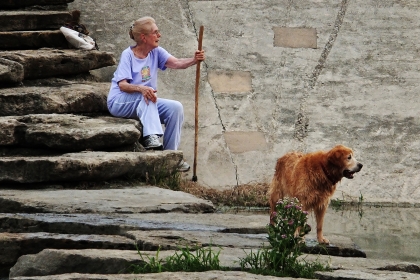
Yet another friend stops by and reports a concern she just received from a fisherman. “Denise,” she warns, “did you know he found a water moccasin over there? It was a big one. He cut its head off. You might want to be careful. He thinks the snakes are going for the duck eggs.”
Denise is not bothered by the news. “Oh, I know about the snakes,” Denise beams back. Then she looks as me, “They are always telling me – ‘Look out for the snakes’ or ‘It’s getting dark, don’t you want to go in?’ – but I tell them I’m not afraid. I survived the war!”
I gather up Charlie to head home before it gets fully dark, and yet another friend (and another dog) has stopped by to see the “mayor.” It’s a long way from the streets of pre-war Paris, and even from her house in Pennsylvania, but Denise Salamone is home.
City of Fort Worth parks boast many “donated” benches, usually dedicated by plaques to those who paid for each specific bench. Denise’s family has decided to give Denise her own bench on the Trinity Trails. They’re just waiting to purchase a nice shady tree to watch over it.
No matter where she sits, tomorrow evening Denise will be back at the Trinity Trails. Moses will chase tennis balls into the water, and “the Mayor” will continue to add new members into her river community.
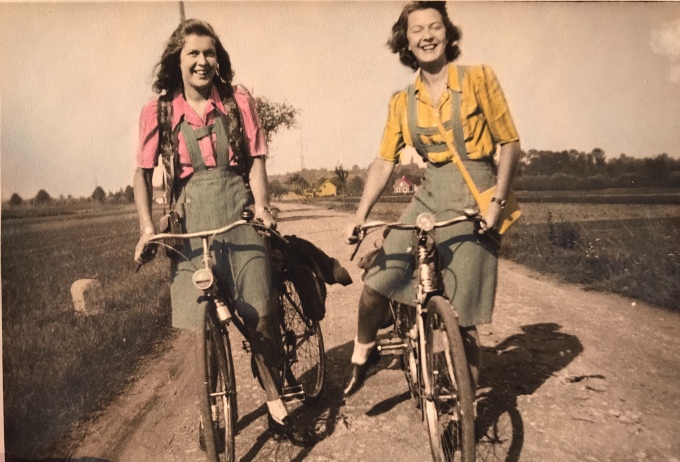
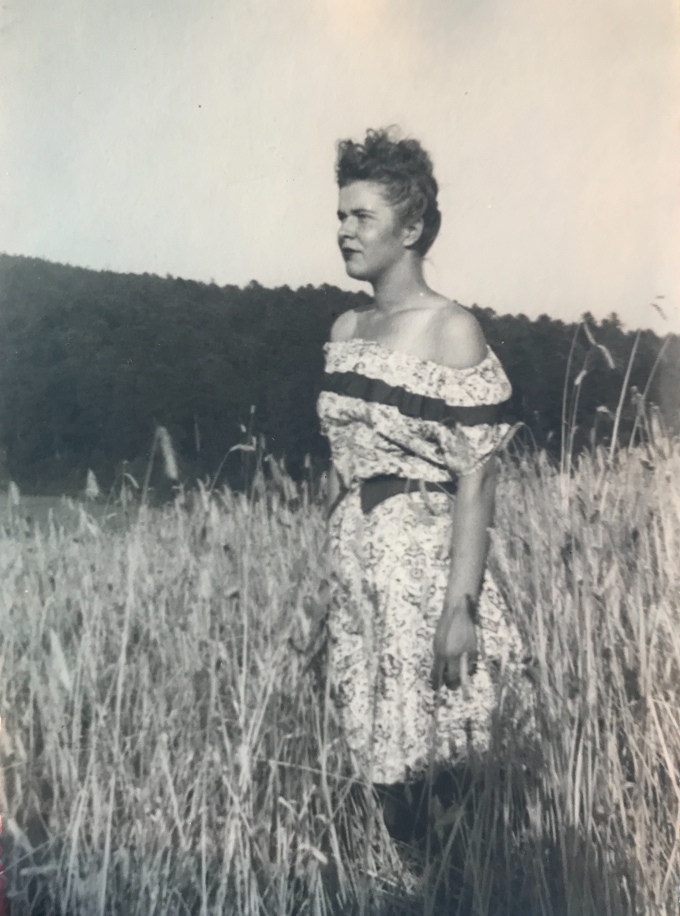
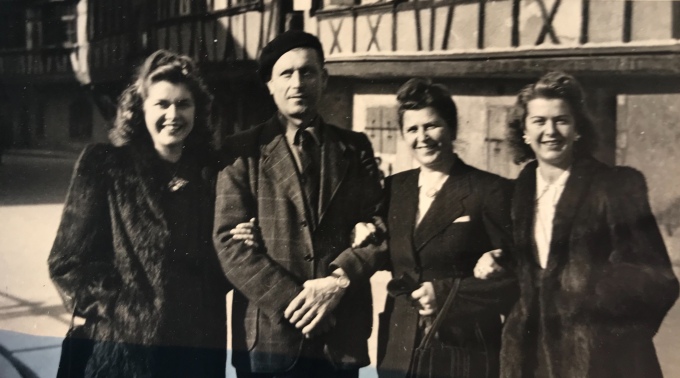
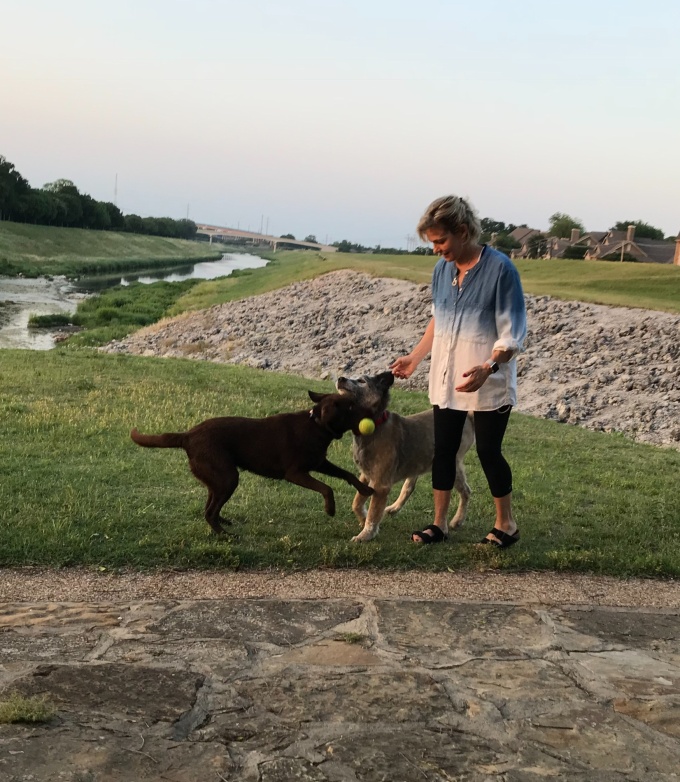
Copyright 2018 @PoliticalSock, all rights reserved.

We (Nancy, Holly, Wrigley and Winston) and I arrived in DFW May 2010. I stayed in corporate housing on the east side of the river from the Mayor’s bench but had long moved on to our permanent home in Mansfield by the time Denise made Fort Worth home. When we met her while walking Wrigley and Winston she had the Moses I, she’s on Moses II now. Denise stood much taller in those days, time has taken it toll on her physically but surely not her spirit. The Trinity is a gathering space for many of gods creatures hence its draw for us humans. Its a reminder of days gone by when neighbors slowed down to listen, share and provide comfort to our souls in need of someone to listen. The Mayor has brought that sense of community to a small slice of Texas. Its unbelievably comforting to get away from the shock jocks, political junkies and talk of what separates us and speak of the things we love in life, our four legged companions, family, food, the outdoors and our neighbors. The Mayor is a mentor, coach, counselor, shepard, friend loved by one and all whom stop to meet her as they travel the Trinity. We look to continue to cherish our time with her and I believe we are all better for the time spent with the Mayor on the banks of the Trinity.
LikeLike